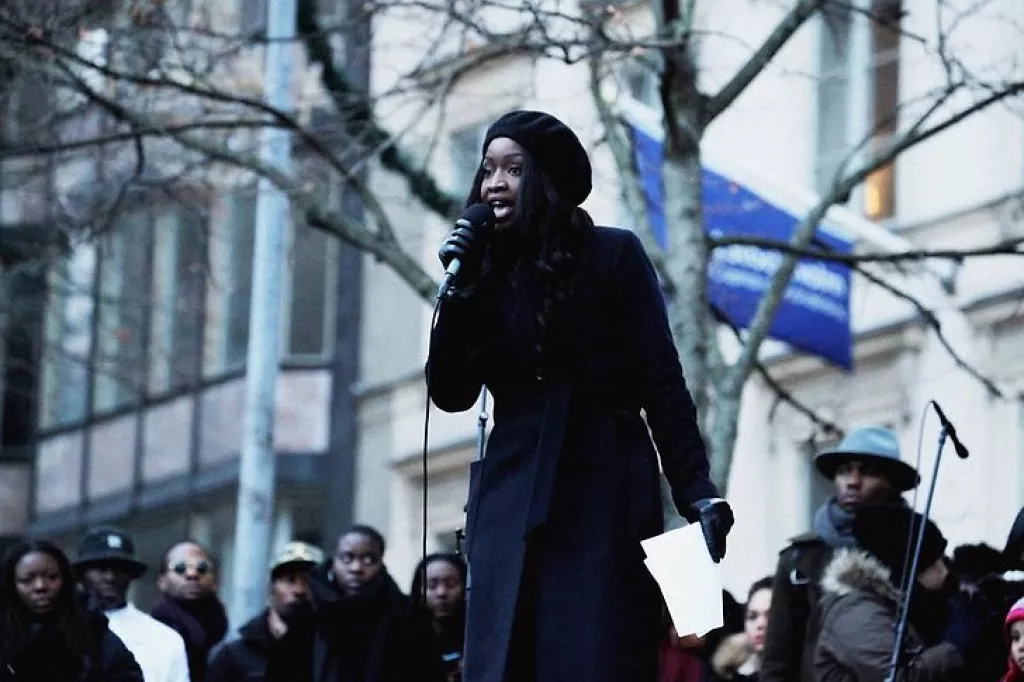Fighting racism in Sweden

Lovette Jallow is a rewarded author, activist and lecturer. Through her social media channels she is spreading knowledge about human rights and equality, using social media as a platform for her activism. In relation to the International Women’s Day 2019 Forum Syd highlights Lovette Jallo. A strong voice in the fight against racism.
In 2017, Lovette started a campaign against the slave trade in Libya and founded the organization ACTION FOR HUMANITY. On her Instagram account with the same name, she discusses and raises issues about sexism, racism, discrimination and injustices, followed by more than 98.000 persons.
Lovette has also created a supportive and interactive Facebook group for “black women, black men and non gender binaries that love Beauty”, which currently has more than 33.000 members.
White saviourism
Lovette visited Forum Syd’s office in Stockholm to talk about difficulties in aid work and the importance of norm critique. The work of many organizations and other actors within the development sector has long been driven by a western-centric assumption on other cultures and countries. This leads to that some organizational work in turn bears with it a harmful side of white saviourism and volontourism.
White saviourism is the term for the phenomenon of western people, mostly white, travelling to a country in order to “help” people and “fix” their problems, BUT without any understanding of the country’s history, current situation or what people need.
It is based on a stereotype of white people acting saviours over people of colour, strongly embedded in colonial history.
White saviourism involves the idea that people in development countries needs to be rescued, that they are not capable of taking control over their own life to improve their life situation - a lack of respect of the agency of the people living in these countries.
Volontourism
Closely related is volontourism, an intersection of volunteer work and tourism. This addresses when volunteers from Europe or America travels to a development country to work for a shorter period in an orphanage or a hospital for example. At the same time the volunteer get the chance to experience a foreign country and a different culture – as a tourist.
Volunteer organizations often use the sale pitch of making a difference while exploring the world. In the foreign country, the volunteer represents a source of knowledge and experience when the reality can be quite different. Actually, not all organizations require that the volunteer has any qualification or education for the work that he or she will take part in.
The focus is the volunteer’s experience rather than the people the volunteer is supposed to help.
Lovette encourages us all to reflect upon our work and question our motives, and to always apply a norm critical perspective. If not, there is a great risk of reinforcing and reproducing harmful stereotypes, norms and power structures.
She believes that the solution of the difficulties of white saviourism and volontourism is increased knowledge. We need to educate ourselves in order to change harmful values and behaviours and to do right.
Having good intentions is not enough.
Those who are being helped ought to be consulted over the matters that concern them. Actors within international aid work must adopt a bottom up-perspective for sustainable solutions that actually will make a difference.
This requires reflection upon your role, your place and your responsibilities. Be humble and don’t try to be the saviour in other people’s lives. Instead, let the locals be the heroes and your organization the supportive side kick.
Want to learn more about white savourism, volontourism and norm critique?
Check out Lovette’s Instagram account @action4humanity_se or @nowhitesaviors, a community in Uganda working to change the structures within development work. Also, listen to the author Chimamanda Ngozi Adichie’s Ted Talk about the danger of a single story and lack of representation.
Women’s rights are human rights!
Unfortunately the obvious statement is far from reality. Still in 2019 women face systematic discrimination of their rights and liberties every day in every country. Women and organisations who stand up for their rights and challenge patriarchal norms faces a lot resistance, in many times we are harassed and threatened.
To commemorate International Women’s Day Forum Syd highlight inspirational women who show that together we have the power to change!
Read our series "Women change the world" of inspiring women's rights activists:
Belarus: Irina Sukhys is protecting the environment from nuclear plants.
Colombia: The story of Jani Silva - a rebel from the heart.
Cambodia: "Being a young girl wont stop me", Song Rany an emerging leader.
Kenya: Grace Lolim, defying culture in the fight for equality.
Liberia: Betty Breeze Doh, standing up for thousands of women in Liberia.
Somalia: Kaltun Sheikh Hassan challenges old norms and practices.
Other recent articles

The power of people powered Public-Private Partnerships
Public–Private Partnerships (PPPs) are often discussed in terms of roads, power plants, housing, and other large infrastructure projects. But as discussed on the People’s Partnership Podcast, PPPs are...

ForumCiv’s social media accounts labelled as “extremist materials” in Belarus
Important message to our Belarusian followers. Any interaction with our content can now lead to legal consequences in Belarus. Please read the information below and take the necessary precautions for...

ForumCiv enters new strategic partnership
ForumCiv is proud to announce a new three-year strategic partnership with Sida, totalling SEK 137 million.